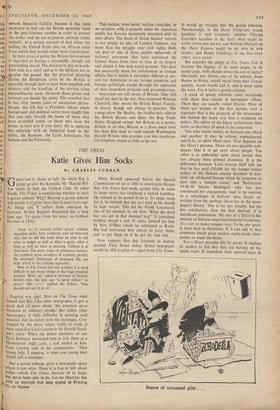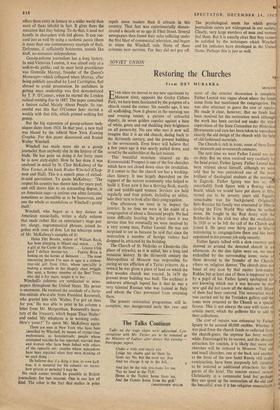THE PRESS
Katie Gives Him Socks
By CHARLES CURRAN
f G113101:1AR is about to fall; the white flag is
going up over the Kremlin; Mr. Harold Wil-
son wants to join the Carlton Club. In other Words, The Time is considering whether to start a gossip column. Why? Because a gossip column will enable it td print news that it must leave out. As things are, le''Suffers from omission by coercion. Walter Bagehot diagnosed this a long time ago. To quote from his essay on Gibbon (written in 1856):
Truth is of various kinds—grave, solemn, dignified, petty, low, ordinary; and an historian who has to tell the truth must be able to tell what is vulgar as well as what is great, what is little as well as what is amazing. Gibbon is at fault here. The petty order of sublunary matters; the common gross existence of ordinary people; the necessary littlenesses of necessary life, are little suited to his sublime narrative.
Men on The Times feel this acutely; it is most difficult to say many things in the huge imperial manner. 'How, sir,' asked a reviewer of Sydney Smith's life,. `do you say "a good fellow" in print?"Mr. —,' replied the Editor, 'You should not say it at all.'
Bagehot was right. Men on The Times must Indeed feel this. Like other newspapers, it gets a good deal of news about 'the common gross existence of ordinary people.' But unlike other newspapers,• it finds difficulty in printing such material. For its stately style ties its tongue. Con- fronted by the more, vulgar kinds of truth, it must react like Lord Curzon in Sir Harold Nicol- son's story. When the junior members of our Paris Embassy persuaded him to join them at a Montmartre night ,spot, a tart smiled at him. Lord Curzon. said to his companions : 'That Young lady, I suppose, is what you young men Would call a:strumpet.'
But a gossip column gives a newspaper space Where it can relax: There it is free to talk about trifles—which The Times,• because of its lingo, has never been able to do: Let me illustrate this with an example . that may appeal to Printing Jse Square. When Parnell appeared before the Special Commission set up in 1888 to investigate charges that The Times had made against him, he came to court every day •clutching a locked handbag. He refused to be parted from it. To make room for it, he insisted that the seat next to his should be kept vacant. This led Sir Frank Lockwood, one of his counsel, to ask him; 'What the devil has you got in that damned bag?' It contained nothing except a pair of socks, knitted for him by Mrs. O'Shea whom he addressed as Katie. She had instructed him always to carry them, and to put them on if he got his feet wet.
Now suppose that this footnote to history reached Fleet Street today. Every newspaper would be able to print it—apart from The Times. It would go straight into the gossip columns. `Peterborough, in the Daily Telegraph, would headline it HER STANDING ORDERS. Charles Greville's headline in the Daily Mail might be KATIE GIVES HIM SOCKS; and William Hickey's in the Daily Express might be HE SITS IN HER SOCKS: and Henry Fielding's in the San FEET FIRST, SAYS KATIE.
But consider the plight of The Times. Can it fracture the dignity of its news pages, or its leader page, with chatter about the sex of socks? Obviously not. Every one of its editors, from Barnes to Haley, would recoil from that. Conse- quently, words would fail it, and it must spike the story. For it lacks a gossip column.
I speak of gossip columns, since everybody calls them that—except in newspaper offices. There they are usually called Diaries. Most of them are written in the first person, over a signature that is the property of the newspaper; but behind the 'name you find a syndicate of toilers. The editor of the Diary orchestrates their work, so that they all speak in the same tone.
This tone varies widely, as between one Diary and another. It may be urbane, sophisticated, ooh-la-la, or plain blunt man. That depends on the Diary's persona. There are two possible tech- niques. One is to get news about people. The other is to embroider news about people that has already been printed elsewhere. It is the difference between 'Lord George Hell tells me that he has paid £50,000 for the former winter -palace of the Sultans outside Istanbul: It con- tains an oil-heated harem which he proposes to turn into a rumpus room,' and 'Red-haired 54-40-30 Maisie Modelgirl, who has just annotmced her engagement, used to be married to a wharfinger at Salford'.—plus details re- written from the cuttings about her in the news- paper's library. This is far less' trouble, but far less satisfactory, than the first method; it is mendicant journalism. The test of a Diary is the amount of hitherto unprinted material it contains, of a sort to make tongues wag. To be any good, it must deal in disclosure. If it can add to that comment which gives readers ready-made view- points, so much the better.
For a Diary provides life by proxy. It enables its readers to .feel that they are moving on the inside track. It capitalises their upward stare It Season of unwanted gifts . . . offers them entry in fantasy to a wider world than most of them inhabit in fact. It gives them the sensation that they belong. To do that, it need not handle its characters with kid gloves. It can suc- ceed just as well by using a sardonic patois (there is more than one contemporary example of that). Deference, if sufficiently boisterous, sounds like bluff, no-nonsense independence.
Gossip-column journalism has a long history. In mid-Victorian London, it was aimed only at a well-to-do public; and its most lurid practitioner was Grenville Murray, founder of the Queen's Messenger—which collapsed when Murray, after being publicly assaulted by Lord Carrington, fled abroad to avoid prosecution. Its usefulness in getting mass readership was first demonstrated by T. P. O'Connor, when he started the London radical evening Star in 1887. The paper contained a feature called Mainly About People. So suc- cessful was this that O'Connor later started a weekly with that title, which printed nothing but gossip.
But the big expansion of gossip-column tech- niques dates from 1924. In that year, a new trail was blazed by the tabloid New York Evening Graphic. For this paper discovered and floated Walter Winchell.
Winchell has made more stir as a gossip journalist than anybody else in the history of the trade. He has gone on doing it for forty years he is now sixty-eight). How he has done it was analysed in detail by St. Clair McKelway of the New Yorker, in his book Walter Winchell (Chap- man and Hall). This is a superb piece of etched- in-acid portraiture. To quote McKelway : 'The respect his country has shown him for years past, and still shows him to an astounding degree, is an American saga—a curious one often fantastic, sometimes so incredible as to be humorous, and one the whole as scandalous as Winchell's gossip itself.'
Winchell, who began as a boy dancer in American music-halls, writes a daily column that reads rather like an entertainer's stage pat- ter; slangy, ungrammatical phrases, joined to- gether with rows of dots. Let me telescope some of Mr. McKelway's samples of it :
Helen Eby Brooks, widow of William Rock, has been plunging in Miami real estate. ... It's a girl at the Carter de Havens.... Lenore Ulric paid 7 dollars income-tax. . . . Fannie Brice is betting on the horses at Belmont.... The most interesting person I've seen in ages is a sixteen- year-old girl from Ohio, whose speciality is making a muscle in her shapely chest wriggle. Her aunt, a former member of the Beef Trust, who did it for years, taught it to her. . . .
Winchell's columns are syndicated to news- papers throughout the United States. His power is enormous. He received the accolade of a forty- five-minute tete-a-rete from President Roosevelt, who greeted him with 'Walter, I've got an item for you.' He was able to print in his column a letter from Mr. Morgenthau, Roosevelt's Secre- tary of the Treasury, which began 'Dear Walter' and ended 'My telephone is in working order. How's yours?' To quote Mr. McKelway again.
There are men in New York who have been
identified by Winchell, by means of crystal-clear euphemisms, as homosexuals; people whose attempted suicides he has reported; married men and women who have been linked with others of the opposite sex; couples whose separations have been reported when they were thinking of no such thing....
He believes that if a thing is true, or even half- true, it is material for his column, no matter how private or personal it may be.
No such career would be possible in British journalism; for two reasons. One is our law of libel. The other is the fact that malice in print repels more readers than it attracts in this country. That fact was experimentally demon- strated a decade or so ago in Fleet Street. Several newspapers then found their sales suffering under the first blast of commercial television, and began to mime the Winchell vein. None of these columns now survives. For they did not pay off. The psychological needs for which gossip journalism caters are widespread in our society. Clearly, very large numbers of men and women feel them. But it is equally clear that they cannot be satisfied by the techniques which Winchell and his imitators have developed in the United States. Perhaps this is just as well.































 Previous page
Previous page